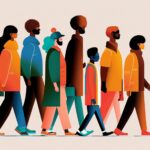Mandatory Digital IDs in the UK: Is this the beginning of a mark of the beast system?
Perhaps you’ve already heard whispers about the new law in the UK — a law that could reshape everyday life in a way most people aren’t ready for. The government is preparing to roll out mandatory digital IDs, and without one, you may not be able to work. Think about that for a moment.
Driving licenses, passports, and national insurance numbers — apparently, those are no longer enough. The UK wants to centralise identity into a single digital ID system. On the surface, it sounds like just another layer of modern technology. But what does it really mean for citizens when access to jobs, services, or even basic participation in society depends on one government-controlled ID?
The UK is not the first country to go down this road. Across the globe, governments are embracing digital identity systems. They promise efficiency, security, and control. But the more nations that join this wave, the louder the alarm bells ring. What starts as a tool against illegal immigration — at least, that’s the justification being used — can quickly grow into something far more intrusive. So we ask: is this about protecting borders, or about controlling people?
Sit back, because what’s happening in the UK may not stay in the UK. The question isn’t just what it means for British citizens, but what it signals for the rest of the world.
What Is a Digital ID?
In simple terms, a digital ID is an electronic version of your identity. Instead of carrying multiple documents, all your personal information — your name, date of birth, address, work status, health data, and more — gets stored in one secure digital system, often accessible via your phone or a government portal.
Sounds convenient, right? One tap, and everything about you is verified. But with that convenience comes risk: what happens when the same system that proves who you are can also restrict who you are allowed to be?
We won’t go into the full technical breakdown here, because we’ve already covered that in a dedicated article. If you want to understand the nuts and bolts of digital IDs, check out our full guide:
👉 What is A Digital ID And How Will It Work?
How Will This Digital ID Affect Your Life in the UK?
It often starts with words that sound harmless — development, technology, progress. But history has shown us something chilling: when governments gain the power to control identity, it rarely ends with just convenience. What begins as innovation can quietly slide into restriction.
So what could this mean for everyday people in the UK? Here are five areas of your life that may be directly affected if you don’t have this digital ID:
1. Employment Opportunities
Without a digital ID, you may simply not be able to work. Employers could be legally bound to verify your status through this system before hiring you. Forget your CV, forget your years of experience — if you’re not logged into the government’s digital identity network, you’re effectively invisible in the job market.
Picture this: You ace a job interview, but when HR tries to process your documents, the system rejects you. No ID, no contract. Just like that, your career is locked behind a digital wall.
2. Healthcare Access
From booking GP appointments to accessing prescriptions, healthcare may eventually require verification through your ID. On the surface, it’s about preventing fraud. But in practice, imagine standing at the pharmacy counter and being refused life-saving medication simply because you don’t “exist” in the digital grid.
It’s no longer just about paperwork — it’s about whether or not you’re allowed to heal.
3. Banking & Financial Services
Banks are one of the first sectors to embrace digital verification. No ID? Then no bank account, no loans, no mortgage. Without access to finance, the ability to live a normal life — renting a flat, paying bills, starting a business — becomes almost impossible.
Think about that moment when you try to withdraw money for rent, and the machine flashes: Access Denied. Suddenly, your financial freedom is gone.
4. Travel & Transportation
Whether it’s applying for a driving license renewal or even using public transportation systems in the future, your ID could be the gateway. What if tapping your ID becomes as normal as tapping your Oyster card? That’s fine if you have one. But without it, your ability to move freely may be cut off.
Imagine watching buses pull away, flights depart, trains whistle past — all while you stand stuck, because the system doesn’t recognise you as eligible to travel.
5. Everyday Purchases & Social Services
This is where it gets scarier. Imagine needing your digital ID to prove your age, buy certain items, or even access social benefits. Over time, the system could creep into every corner of life, making it almost impossible to function in society without state-approved identification.
Picture going to the supermarket, scanning your basket at the self-checkout, and the screen flashes: ID Required. But you don’t have one. You leave empty-handed, not because you lack money, but because you lack permission.
Is This the Beginning of the Beast System?

Now, many things happening today feel strangely familiar — almost like they echo words written thousands of years ago. The Bible speaks of a time when people would not be able to buy or sell without a certain “mark.” And here we are, in an age where access to work, healthcare, travel, or even food could be tied to a single digital ID.
Look around. We have AI rising at lightning speed. We see surveillance technology becoming smarter, cameras on every corner, and systems that know more about us than we know about ourselves. It’s not about sparking panic — but if you’re being told to embrace a digital ID without questioning it, maybe it’s time to think twice.
By the way, did you know that Christianity is increasingly restricted in the UK? Churches face more pressure, public expressions of faith are silenced, and certain biblical views are now considered offensive or even punishable. If faith can be censored, why wouldn’t identity be controlled? Think twice, my friend. Why not?
Here are some chilling comparisons between digital ID systems and the beast system described in Scripture:
1. Control of Buying and Selling
The prophecy speaks of people not being able to buy or sell without the mark. Digital IDs are being tied to payments, benefits, and even access to basic goods. No ID, no transaction.
2. Total Surveillance
The beast system thrives on watching, tracking, and knowing. A digital ID ensures the government — and by extension, big tech — can monitor where you work, what you buy, where you travel, and even what you believe.
3. Forced Compliance
In Scripture, refusal of the mark meant exclusion and suffering. In the digital ID world, refusal may mean losing your job, your healthcare, or your right to live freely. Different age, same spirit of coercion.
4. Erosion of Faith and Freedom
The beast system wasn’t just about economics — it was about allegiance. When governments demand total trust in their systems, faith in God becomes secondary. Slowly, freedom of conscience is replaced with forced obedience to man-made power.
A Closing Reflection
In developments like this, one must stop and ask: how will this end? Today it’s just a card, an app, a digital key. Tomorrow, it could be the only thing standing between you and survival. Progress often wears the mask of convenience, but history teaches us that unchecked power rarely ends well.
So take a moment, breathe, and think deeply. This isn’t about fear — it’s about awareness.
💜 If you found this post eye-opening, show some love by clicking the little heart below. And don’t just keep this to yourself — share your thoughts in the comments. Do you see digital IDs as a step forward or a step into prophecy unfolding?
Special Links
Learn More About These Digital IDs On GOV.UK.
The Voiceover AI Is Speechma. Available Here
Background Audio Made And Produced By OiBeats Here
Track Produced By OiBeats Is Available Here.







